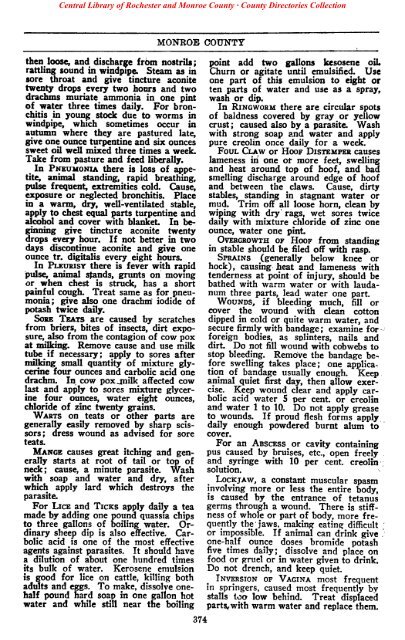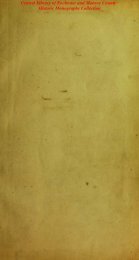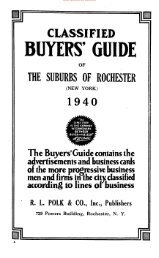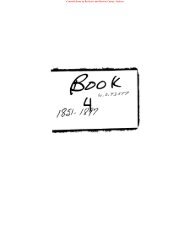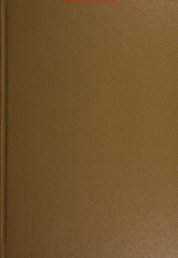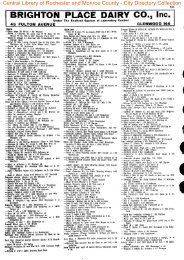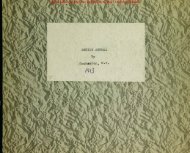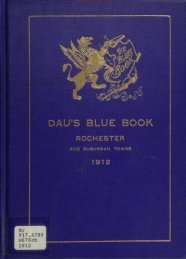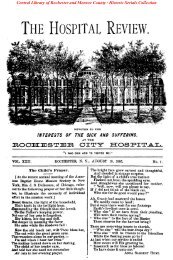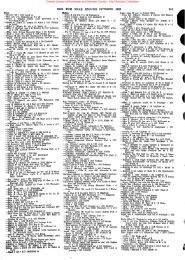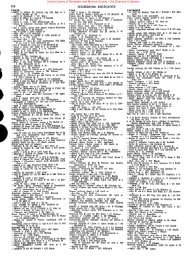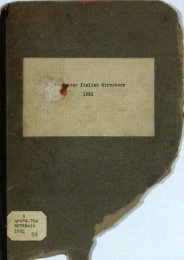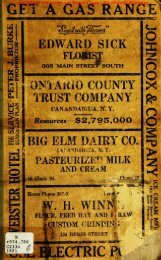The Farm Journal Illustrated Rural Directory of Monroe County, New ...
The Farm Journal Illustrated Rural Directory of Monroe County, New ...
The Farm Journal Illustrated Rural Directory of Monroe County, New ...
Create successful ePaper yourself
Turn your PDF publications into a flip-book with our unique Google optimized e-Paper software.
Central Library <strong>of</strong> Rochester and <strong>Monroe</strong> <strong>County</strong> · <strong>County</strong> Directories Collection<br />
MONROE COUNTY<br />
then loose, and discharge from nostrils;<br />
rattling sound in windpipe. Steam as in<br />
sore throat and give tincture aconite<br />
twenty drops every two hours and two<br />
drachms muriate ammonia in one pint<br />
<strong>of</strong> water three times daily. For bronchitis<br />
in young stock due to worms in<br />
windpipe, which sometimes occur in<br />
autumn where they are pastured late,<br />
give one ounce turpentine and six ounces<br />
sweet oil well mixed three times a week.<br />
Take from pasture and feed liberally.<br />
In PNEUMONIA there is loss <strong>of</strong> appetite,<br />
animal standing, rapid breathing,<br />
pulse frequent, extremities cold. Cause,<br />
exposure or neglected bronchitis. Place<br />
in a warm, dry, well-ventilated stable,<br />
apply to chest equal parts turpentine and<br />
alcohol and cover with blanket. In beginning<br />
give tincture aconite twenty<br />
drops every hour. If not better in two<br />
days discontinue aconite and give one<br />
ounce tr. digitalis every eight hours.<br />
In PLEURISY there is fever with rapid<br />
pulse, animal stands, grunts on moving<br />
or when chest is struck, has a short<br />
painful cough. Treat same as for pneumonia;<br />
give also one drachm iodide <strong>of</strong><br />
potash twice daily.<br />
SORE TEATS are caused by scratches<br />
from briers, bites <strong>of</strong> insects, dirt exposure,<br />
also from the contagion <strong>of</strong> cow pox<br />
at milking. Remove cause and use milk<br />
tube if necessary; apply to sores after<br />
milking small quantity <strong>of</strong> mixture glycerine<br />
four ounces and carbolic acid one<br />
drachm. In cow pox jnilk affected cow<br />
last and apply to sores mixture glycerine<br />
four ounces, water eight ounces,<br />
chloride <strong>of</strong> zinc twenty grains.<br />
WARTS on teats or other parts are<br />
generally easily removed by sharp scissors;<br />
dress wound as advised for sore<br />
teats.<br />
MANGE causes great itching and generally<br />
starts at root <strong>of</strong> tail or top <strong>of</strong><br />
neck; cause, a minute parasite. Wash<br />
with soap and water^ and dry, after<br />
which apply lard which destroys the<br />
parasite.<br />
For LICE and TICKS apply daily a tea<br />
made by adding one pound quassia chips<br />
to three gallons <strong>of</strong> boiling water. Ordinary<br />
sheep dip is also effective. Carbolic<br />
acid is one <strong>of</strong> the most effective<br />
agents against parasites. It should have<br />
a dilution <strong>of</strong> about one hundred times<br />
its bulk <strong>of</strong> water. Kerosene emulsion<br />
is good for lice on cattle, killing both<br />
adults and eggs. To make, dissolve onehalf<br />
pound hard soap in one gallon hot<br />
water and while still near the boiling<br />
374<br />
point add two gallons kesosene oil.<br />
Churn or agitate until emulsified. Use<br />
one part <strong>of</strong> this emulsion to eight or<br />
ten parts <strong>of</strong> water and use as a spray,<br />
wash or dip.<br />
In RINGWORM there are circular spots<br />
<strong>of</strong> baldness covered by gray or yellow<br />
crust; caused also by a parasite. Wash<br />
with strong soap and water and apply<br />
pure creolin once daily for a week.<br />
FOUL CLAW or HOOF DISTEMPER causes<br />
lameness in one or more feet, swelling<br />
and heat around top <strong>of</strong> ho<strong>of</strong>, and bad<br />
smelling discharge around edge <strong>of</strong> ho<strong>of</strong><br />
and between the claws. Cause, dirty<br />
stables, standing in stagnant water or<br />
mud. Trim <strong>of</strong>f all loose horn, clean by<br />
wiping with dry' rags, wet sores twice<br />
daily with mixture chloride <strong>of</strong> zinc one<br />
ounce, water one pint.<br />
OVERGROWTH OF HOOF from standing<br />
in stable should be. filed <strong>of</strong>f with rasp.<br />
SPRAINS (generally below knee or<br />
hock), causing heat and lameness with<br />
tenderness at point <strong>of</strong> injury, should be<br />
bathed with warm water or with laudanum<br />
three parts, lead water one part.<br />
WOUNDS, if bleeding much, fill or<br />
cover the wound with clean cotton<br />
dipped in cold or quite warm water, and<br />
secure firmly with bandage; examine for<br />
foreign bodies, as splinters, nails and<br />
dirt. Do not fill wound with cobwebs to<br />
stop bleeding. Remove the bandage be^<br />
fore swelling takes place; one application<br />
<strong>of</strong> bandage usually enough. Keep<br />
animal quiet first day, then allow exercise.<br />
Keep wound clear and apply carbolic<br />
acid water 5 per cent, or creolin<br />
and water 1 to 10. Do not apply grease<br />
to wounds. If proud flesh forms apply<br />
daily enough powdered burnt alum to<br />
cover.<br />
For an ABSCESS or cavity containing<br />
pus caused by bruises, etc., open freely<br />
and syringe with 10 per cent, creolin<br />
solution.<br />
LOCKJAW, a constant muscular spasm<br />
involving more or less the entire body,<br />
is caused by the entrance <strong>of</strong> tetanus<br />
germs through a wound. <strong>The</strong>re is stiffness<br />
<strong>of</strong> whole or part <strong>of</strong> body, more frequently<br />
the jaws, making eating difficult ,<br />
or impossible. If animal can drink give .<br />
one-half ounce doses bromide potash<br />
five times daily; dissolve and place on<br />
food or gruel or in water given to drink.<br />
Do not drench, and keep quiet.<br />
INVERSION OF VAGINA most frequent<br />
in springers, caused most frequently by<br />
stalls too low behind. Treat displaced<br />
parts, with warm water and replace them.


